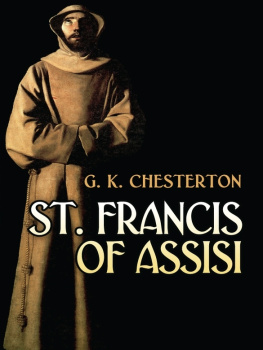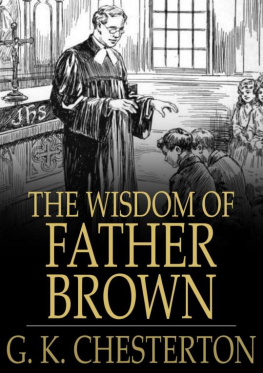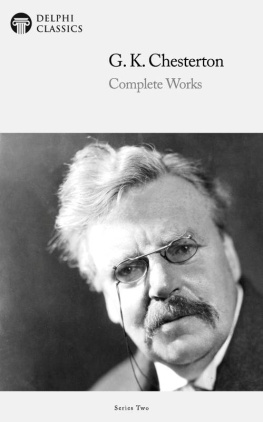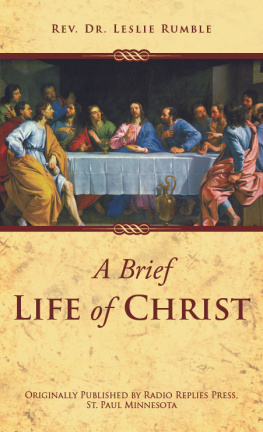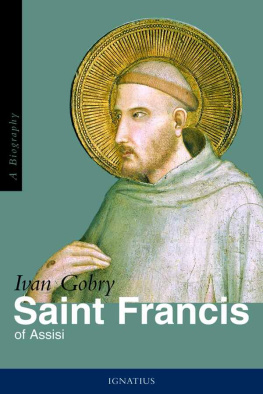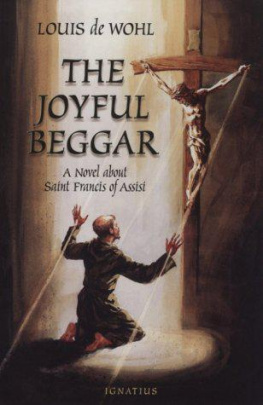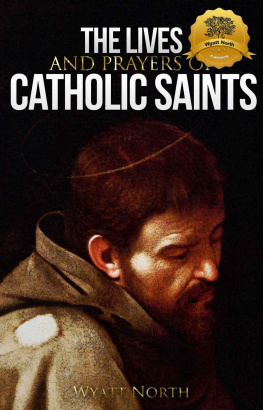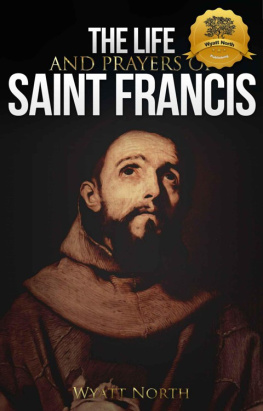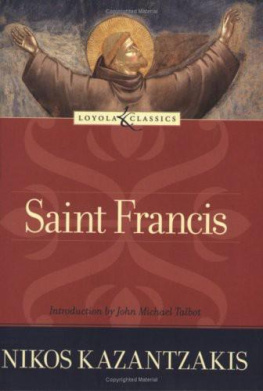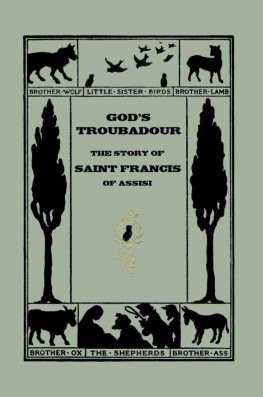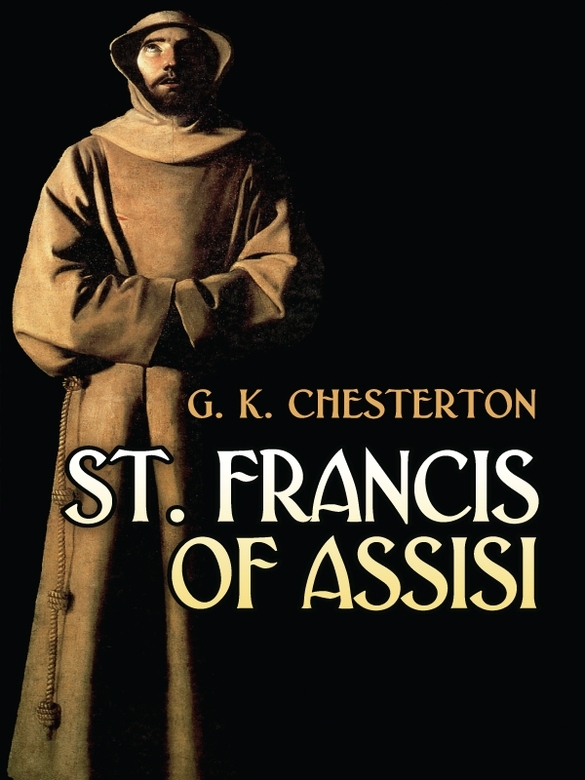I. The Problem of St. Francis
A sketch of St. Francis of Assisi in modern English may be written in one of three ways. Between these the writer must make his selection; and the third way, which is adopted here, is in some respects the most difficult of all. At least, it would be the most difficult if the other two were not impossible.
First, he may deal with this great and most amazing man as a figure in secular history and a model of social virtues. He may describe this divine demagogue as being, as he probably was, the worlds one quite sincere democrat. He may say (what means very little) that St. Francis was in advance of his age. He may say (what is quite true) that St. Francis anticipated all that is most liberal and sympathetic in the modern mood; the love of nature; the love of animals; the sense of social compassion; the sense of the spiritual dangers of prosperity and even of property. All those things that nobody understood before Wordsworth were familiar to St. Francis. All those things that were first discovered by Tolstoy had been taken for granted by St. Francis. He could be presented, not only as a human but a humanitarian hero; indeed as the first hero of humanism. He has been described as a sort of morning star of the Renaissance. And in comparison with all these things, his ascetical theology can be ignored or dismissed as a contemporary accident, which was fortunately not a fatal accident. His religion can be regarded as a superstition, but an inevitable superstition, from which not even genius could wholly free itself; in the consideration of which it would be unjust to condemn St. Francis for his self-denial or unduly chide him for his chastity. It is quite true that even from so detached a standpoint his stature would still appear heroic. There would still be a great deal to be said about the man who tried to end the Crusades by talking to the Saracens or who interceded with the Emperor for the birds. The writer might describe in a purely historical spirit the whole of that great Franciscan inspiration that was felt in the painting of Giotto, in the poetry of Dante, in the miracle plays that made possible the modern drama, and in so many other things that are already appreciated by the modern culture. He may try to do it, as others have done, almost without raising any religious question at all. In short, he may try to tell the story of a saint without God; which is like being told to write the life of Nansen and forbidden to mention the North Pole.
Second, he may go to the opposite extreme, and decide, as it were, to be defiantly devotional. He may make the theological enthusiasm as thoroughly the theme as it was the theme of the first Franciscans. He may treat religion as the real thing that it was to the real Francis of Assisi. He can find an austere joy, so to speak, in parading the paradoxes of asceticism and all the holy topsy-turvydom of humility. He can stamp the whole history with the Stigmata, record fasts like fights against a dragon; till in the vague modern mind St. Francis is as dark a figure as St. Dominic. In short he can produce what many in our world will regard as a sort of photographic negative, the reversal of all lights and shades; what the foolish will find as impenetrable as darkness and even many of the wise will find almost as invisible as if it were written in silver upon white. Such a study of St. Francis would be unintelligible to any one who does not share his religion, perhaps only partly intelligible to any one who does not share his vocation. According to degrees of judgment, it will be regarded as something too bad or too good for the world. The only difficulty about doing the thing in this way is that it cannot be done. It would really require a saint to write the life of a saint. In the present case the objections to such a course are insuperable.
Third, he may try to do what I have tried to do here; and, as I have already suggested, the course has peculiar problems of its own. The writer may put himself in the position of the ordinary modern outsider and enquirer; as indeed the present writer is still largely and was once entirely in that position. He may start from the standpoint of a man who already admires St. Francis, but only for those things which such a man finds admirable. In other words he may assume that the reader is at least as enlightened as Renan or Matthew Arnold; but in the light of that enlightenment he may try to illuminate what Renan and Matthew Arnold left dark. He may try to use what is understood to explain what is not understood. He may say to the modern English reader: Here is an historical character which is admittedly attractive to many of us already, by its gaiety, its romantic imagination, its spiritual courtesy and camaraderie, but which also contains elements (evidently equally sincere and emphatic) which seem to you quite remote and repulsive. But after all, this man was a man and not half a dozen men. What seems inconsistency to you did not seem inconsistency to him. Let us see whether we can understand, with the help of the existing understanding, these other things that seem now to be doubly dark, by their intrinsic gloom and their ironic contrast. I do not mean, of course, that I can really reach such a psychological completeness in this crude and curt outline. But I mean that this is the only controversial condition that I shall here assume; that I am dealing with the sympathetic outsider. I shall not assume any more or any less agreement than this. A materialist may not care whether the inconsistencies are reconciled or not. A Catholic may not see any inconsistencies to reconcile. But I am here addressing the ordinary modern man, sympathetic but sceptical, and I can only rather hazily hope that, by approaching the great saints story through what is evidently picturesque and popular about it, I may at least leave the reader understanding a little more than he did before of the consistency of a complete character; that by approaching it in this way, we may at least get a glimmering of why the poet who praised his lord the sun, often hid himself in a dark cavern, of why the saint who was so gentle with his Brother the Wolf was so harsh to his Brother the Ass (as he nicknamed his own body), of why the troubadour who said that love set his heart on fire separated himself from women, of why the singer who rejoiced in the strength and gaiety of the fire deliberately rolled himself in the snow, of why the very song which cries with all the passion of a pagan, Praised be God for our Sister, Mother Earth, which brings forth varied fruits and grass and glowing flowers, ends almost with the words Praised be God for our Sister, the death of the body.
Renan and Matthew Arnold failed utterly at this test. They were content to follow Francis with their praises until they were stopped by their prejudices; the stubborn prejudices of the sceptic. The moment Francis began to do something they did not understand or did not like, they did not try to understand it, still less to like it; they simply turned their backs on the whole business and walked no more with him. No man will get any further along a path of historical enquiry in that fashion. These sceptics are really driven to drop the whole subject in despair, to leave the most simple and sincere of all historical characters as a mass of contradictions, to be praised on the principle of the curates egg. Arnold refers to the asceticism of Alverno almost hurriedly, as if it were an unlucky but undeniable blot on the beauty of the story; or rather as if it were a pitiable break-down and bathos at the end of the story. Now this is simply to be stone-blind to the whole point of any story. To represent Mount Alverno as the mere collapse of Francis is exactly like representing Mount Calvary as the mere collapse of Christ. Those mountains are mountains, whatever else they are, and it is nonsense to say (like the Red Queen) that they are comparative hollows or negative holes in the ground. They were quite manifestly meant to be culminations and landmarks. To treat the Stigmata as a sort of scandal, to be touched on tenderly but with pain, is exactly like treating the original five wounds of Jesus Christ as five blots on His character. You may dislike the idea of asceticism; you may dislike equally the idea of martyrdom; for that matter you may have an honest and natural dislike of the whole conception of sacrifice symbolised by the cross. But if it is an intelligent dislike, you will still retain the capacity for seeing the point of a story; of the story of a martyr or even the story of a monk. You will not be able rationally to read the Gospel and regard the Crucifixion as an afterthought or an anti-climax or an accident in the life of Christ; it is obviously the point of the story like the point of a sword, the sword that pierced the heart of the Mother of God.

